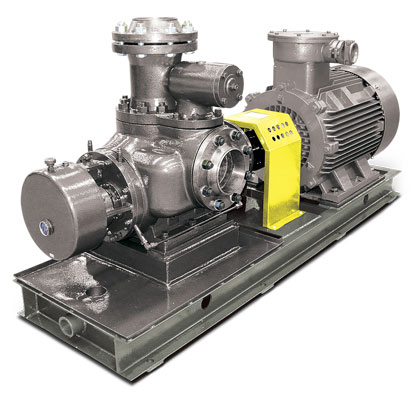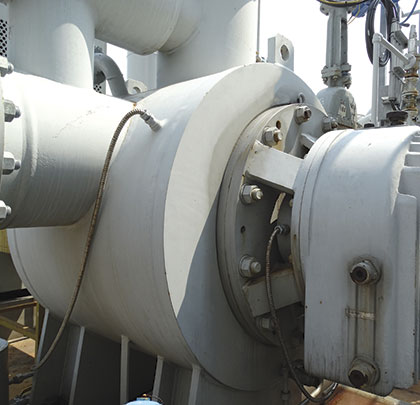As mentioned in part 1 of this series, the solution to the shortcomings of centrifugal pumps can be positive displacement (PD) screw pumps. The problem is not only overcoming the built-in advantages of the centrifugal pump’s vast installed base, but getting design engineers to acknowledge or even become aware that there are alternatives like screw pumps.
THE SOLUTION
Simply put, many engineers are not taught about screw pumps in their studies, and many who are aware of them have a preconceived notion of their shortcomings, or that they are nothing more than lube pumps capable of handing only low flow rates. In reality, today’s screw pumps have experienced remarkable advancements in terms of the flow rates that they can handle, with flow ranges from 220 gallons per minute to 11,000 gallons per minute not uncommon.
In truth, the design of PD screw pumps makes them capable of handling various liquids—even those with higher viscosities, such as the crude oil that is now being recovered in some areas of Canada and the rest of the world. The operating principle sees opposed screws engaged to form a sealed cavity with the surrounding pump casing. As the drive screws turn, the fluid is shifted and steadily and constantly conveyed to the discharge port of the pump, which creates a volumetrically consistent flow rate regardless of the pumping pressure.
The list of benefits provided by screw-pump technology in oil-and-gas fluid-handling applications is a long and impressive one:
- Ability to handle a wide range of flows, pressures, liquid types and viscosities
- Constant flow, even in the presence of varying system backpressures due to viscosity changes
- High volumetric and overall operating efficiencies, resulting in reduced operational costs
- Controllable output via variable capacities
- Low internal velocities
- Self-priming operation and good suction characteristics
- High tolerance for entrained air and other gases – a prime consideration in oil production
- Low mechanical vibration lengthens service life
- Intrinsically smooth and quiet operation
- Extremely low pulsation reduces stress and prolongs life of associated fluid-transfer components (piping, hoses, etc.)
Realizing the operational advantages that can be achieved when using screw pumps in oil-and-gas fluid-transfer applications, Blackmer®, Grand Rapids, Michigan, a leading provider of pumps and compressors for industrial use, and a product brand of PSG®, Oakbrook Terrace, Illinois, a Dover company, has developed the S Series Screw Pump product line.
Specifically, Blackmer recommends two of its S Series pump models—Twin Screw with Timing Gear (WTG) and Triple Screw—for oil-and-gas fluid-transfer activities.

Featured Image: Blackmer S Series twin screw pumps with timing gear (WTG) have been designed with external bearings and a timing-gear transmission, which produces double-suction, self-priming operation with no metal-to-metal contact between the pump’s internal components. This design helps the pump achieve the highest flow rates of any rotary PD pump, even at varying back-pressures and viscosity levels.
Above: Blackmer S Series twin screw pumps with timing gear (WTG) have been designed with external bearings and a timing-gear transmission, which produces double-suction, self-priming operation with no metal-to-metal contact between the pump’s internal components. This design helps the pump achieve the highest flow rates of any rotary PD pump, even at varying back-pressures and viscosity levels.
The Twin Screw (WTG) pumps have been designed with external bearings and a timing-gear transmission, which produces double-suction, self-priming operation with no metal-to-metal contact between the pump’s internal components. This design helps the Twin Screw (WTG) pump achieve the highest flow rates of any rotary PD pump, even at varying backpressures and viscosity levels. In fact, the deliverable flow rate of a PD screw pump, unlike a centrifugal pump, actually increases as the fluid’s viscosity increases. These design characteristics also make screw pumps suitable for all types of transfer applications, including low- or high-viscosity, lubricating or non-lubricating, neutral or aggressive, and clean or contaminated fluids.
The Triple Screw pumps are made to handle clean lubricating fluids without solid content across a wide range of viscosities, temperatures and pressures. They are designed with a male drive spindle, two female secondary spindles and a case that contains the screws, which allows the fluid to move smoothly and continuously in an axial direction from suction to discharge. This method of operation delivers smooth, constant product flow with low noise and high levels of energy efficiency.
CONCLUSION
We all like things that are familiar; they provide comfort in a world that seems to be changing much too rapidly. Therefore, it’s easy to see why operators in the various segments of oil-and-gas production – upstream, midstream and downstream – have come to rely so heavily on centrifugal pumps for their fluid-transfer needs – it is a technology that has proven over many years to satisfy their demands in optimizing a very complicated production and supply chain.
But when we become entirely wedded to one way of doing things we become blind to alternatives that may be even more successful than the status quo. Such is the case with PD screw pumps and the role they could play in optimizing fluid transfer in oil-and-gas operations. While screw pumps may have a higher purchase cost than centrifugal pumps, it’s best to remember this old bromide: “buying cheap just means you’ll have to buy it again.” And, anyway, the main operational advantages that screw pumps have—the ability to handle a wider window of fluid viscosities at higher rates and pressures, lower energy consumption and no BEP to be concerned about—leave them poised to become a more efficient, reliable and versatile alternative to centrifugal pumps in critical oil-and-gas fluid-handling applications. υ
Josh Pepper is the global product manager—screw pumps for Blackmer®, Grand Rapids, Michigan, and can be reached at 616.248.9235 or josh.pepper@psgdover.com. Michael Moore is Blackmer’s senior director, business development—screw pumps and can be reached at 519.802.2106 or michael.moore@psgdover.com. For more information on Blackmer’s full line of pumps and compressors, visit www.blackmer.com or call 616.241.1611. Blackmer is a product brand of PSG®, a Dover company, Oakbrook Terrace, Illinois. PSG is comprised of several of the world’s leading pump brands, including Abaque®, Almatec®, Blackmer®, Ebsray®, Finder, EnviroGear®, Griswold™, Mouvex®, Neptune™, Quattroflow™, RedScrew™, and Wilden®. For more information, visit www.psgdover.com.
_______________________________________________________
MODERN PUMPING TODAY, December 2017
Did you enjoy this article?
Subscribe to the FREE Digital Edition of Modern Pumping Today Magazine!



